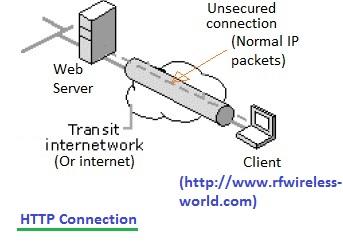HTTP Protocol: Advantages and Disadvantages
Advertisement
This article explores the pros and cons of the HTTP protocol, a fundamental technology for web communication.
What is HTTP?
HTTP (Hypertext Transfer Protocol) serves as the communication backbone between web clients (like your browser) and web servers. It facilitates the transfer of data, allowing you to browse websites and interact with online services.
- It typically establishes an unsecured connection, making it potentially vulnerable to hacking.
- HTTP relies on standard TCP/IP and UDP protocols for data transmission.

A more secure version of HTTP is HTTPS. HTTPS encrypts data before transmission, ensuring safer communication. It utilizes security protocols like SSL/TLS at the transport layer and potentially at layers 2 and 3.
HTTP is commonly used for web browsing and email applications, operating on port 8080 or 80. It follows a request/response model. The client sends an HTTP request to the server, which then provides the requested resources (HTML files, etc.) or performs actions on behalf of the client, ultimately returning a response.
HTTP, being an application layer protocol, is built upon TCP. HTTP/1.0 employs methods like GET, POST, and HEAD, while HTTP/1.1 expands on these with PUT, DELETE, TRACE, OPTION, and CONNECT.
Benefits of HTTP
Here’s a look at the advantages of using HTTP:
- Lower Resource Usage: It consumes less CPU and memory due to fewer simultaneous connections.
- HTTP Pipelining: Enables the pipelining of requests and responses, improving efficiency.
- Reduced Network Congestion: Fewer TCP connections lead to less congestion on the network.
- Reduced Latency: Handshaking happens only during initial connection setup. Subsequent requests experience lower latency because there’s no repeated handshaking.
- Error Reporting: Errors can be reported without terminating the TCP connection.
Drawbacks of HTTP
Despite its benefits, HTTP also has some disadvantages:
- Point-to-Point Connection: Primarily designed for point-to-point connections.
- Not Optimized for Mobile: Lacks specific optimizations for mobile devices.
- No Push Capabilities: Doesn’t inherently support server-initiated push notifications.
- Verbose: The protocol can be quite verbose, adding overhead to data transmission.
- Unreliable Exchange (without retry logic): Doesn’t guarantee reliable exchange without implementing retry mechanisms.
- Server Availability Issues: The client doesn’t close the connection immediately after receiving all the data, potentially making the server unavailable for a longer duration.
HTTP/1.1 and HTTP/2 have emerged as successors to HTTP/1.0, addressing many of its limitations.
Advertisement
 RF
RF




